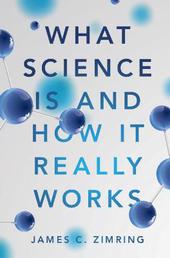
|
What Science Is and How It Really Works
Hardback
Main Details
Description
Scientific advances have transformed the world. However, science can sometimes get things wrong, and at times, disastrously so. Understanding the basis for scientific claims and judging how much confidence we should place in them is essential for individual choice, societal debates, and development of public policy and laws. We must ask: what is the basis of scientific claims? How much confidence should we put in them? What is defined as science and what is not? This book synthesizes a working definition of science and its properties, as explained through the eyes of a practicing scientist, by integrating advances from philosophy, psychology, history, sociology, and anthropology into a holistic view. Crucial in our political climate, the book fights the myths of science often portrayed to the public. Written for a general audience, it also enables students to better grasp methodologies and helps professional scientists to articulate what they do and why.
Author Biography
James C. Zimring is a Professor of Pathology at the University of Virginia where he pursues basic and translational research in the field of transfusion medicine and blood biology. He has an M.D. and also a Ph.D. in Immunology, both awarded from Emory University, Atlanta, and has published over 120 research articles in his field of study. Professor Zimring is the recipient of multiple awards for his research and teaching, and he is an elected member of the American Society for Clinical Investigation (ASCI).
Reviews'We live in a world where the discoveries of well-done science are rapidly improving the lives of millions; but at the same time poorly done inquiry that fails to meet the foundational principles of science, even when carried out with all good intentions, can result in harmful false conclusions resulting in wasting of resources, bad results for individuals and bad public policy for nations. Dr Zimring has produced a marvelously cogent and eminently readable book that explains how to recognize good science and know when to question poor 'scientific' conclusions. Reading this book places scientists and non-scientists on the same playing field when discussing critical issues and making important decisions. I would feel much better going to the polls if every voter understood the lessons that Zimring effortlessly communicates.' Brian R. Smith, Yale University, Connecticut 'The message of this extraordinary book is loud and clear: we need a better understanding of science. That it is written by a scientist - and aimed in part at a scientific audience - makes the message all the more credible ... and urgent. Science may not be perfect, but it is the best hope we've got. Zimring has written an engaging and accessible book on the importance of digging beneath what we think we know about science.' Lee McIntyre, Boston University and author of The Scientific Attitude: Defending Science from Denial, Fraud, and Pseudoscience 'In his recent book, What Science Is and How It Really Works, University of Virginia Professor of Pathology James C. Zimring, aspired to answer those vital questions. He correctly recognizes that the process of science is woefully misunderstood by the general public and even by many scientists. Anchored with a keen grasp of philosophy, logic, and reason, Zimring attempted to resolve a variety of misconstructions.' Ross Pomeroy, RealClearScience (https://www.realclearscience.com) '[Zimmering] asks important questions, such as: What are scientific 'facts'? How does science differ from non-science? And, how is a layperson to judge a claim that asserts it is 'scientific'? The special imprimatur given to the findings of science (the so-called Legend of Science) requires us to be able to evaluate its claims rationally and dispassionately, from the benefits of vaccines to the threats of climate change. The book's three parts are devoted, respectively, to scientific reasoning and logic; flaws that undermine natural human observation; and how scientific processes and methods seek to addresses those flaws. The author's goal is to assist nonscientists in assessing scientific claims while-perhaps more importantly-enabling scientists to defend science (by deconstructing the Legend).' N. Sadanand, Choice 'I certainly wish I had read a book like Zimring's when I started my graduate studies; this would have helped me avoid many of the mistakes I made ... I recommend Zimring's book for students who contemplate a career in science ... Zimring says that science very much needs its fringe thinkers, although it often treats them badly. In conclusion, to paraphrase Winston Churchill, science is the worst way to understand the world except for all the other ways. What Science Is and How It Really Works gives lots of examples of how the scientific method has allowed the big brains of unpromising apes to understand the world better than we had any right to expect.' Stanley A. Rice, The American Journal of Psychology
|